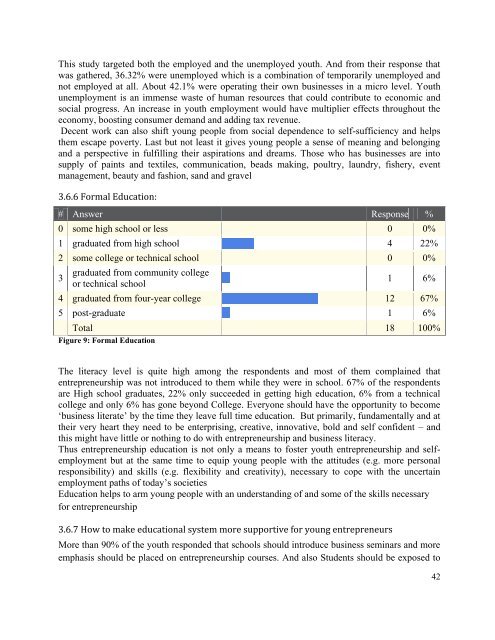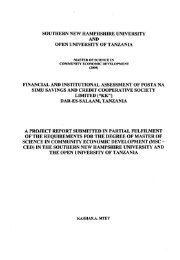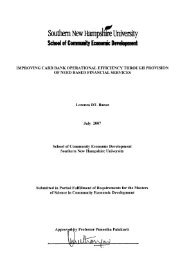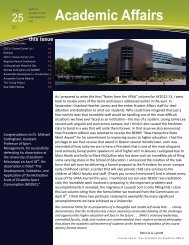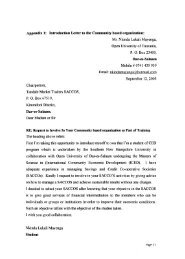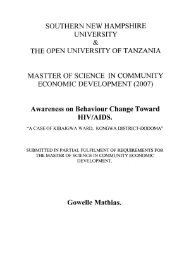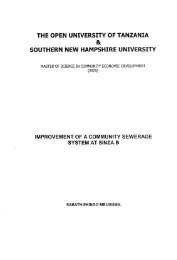Promoting youth entrepreneurship in Lagos, Nigeria - SNHU ...
Promoting youth entrepreneurship in Lagos, Nigeria - SNHU ...
Promoting youth entrepreneurship in Lagos, Nigeria - SNHU ...
Create successful ePaper yourself
Turn your PDF publications into a flip-book with our unique Google optimized e-Paper software.
This study targeted both the employed and the unemployed <strong>youth</strong>. And from their response thatwas gathered, 36.32% were unemployed which is a comb<strong>in</strong>ation of temporarily unemployed andnot employed at all. About 42.1% were operat<strong>in</strong>g their own bus<strong>in</strong>esses <strong>in</strong> a micro level. Youthunemployment is an immense waste of human resources that could contribute to economic andsocial progress. An <strong>in</strong>crease <strong>in</strong> <strong>youth</strong> employment would have multiplier effects throughout theeconomy, boost<strong>in</strong>g consumer demand and add<strong>in</strong>g tax revenue.Decent work can also shift young people from social dependence to self-sufficiency and helpsthem escape poverty. Last but not least it gives young people a sense of mean<strong>in</strong>g and belong<strong>in</strong>gand a perspective <strong>in</strong> fulfill<strong>in</strong>g their aspirations and dreams. Those who has bus<strong>in</strong>esses are <strong>in</strong>tosupply of pa<strong>in</strong>ts and textiles, communication, beads mak<strong>in</strong>g, poultry, laundry, fishery, eventmanagement, beauty and fashion, sand and gravel3.6.6 Formal Education:# Answer Response %0 some high school or less 0 0%1 graduated from high school 4 22%2 some college or technical school 0 0%3graduated from community collegeor technical school1 6%4 graduated from four-year college 12 67%5 post-graduate 1 6%Total 18 100%Figure 9: Formal EducationThe literacy level is quite high among the respondents and most of them compla<strong>in</strong>ed that<strong>entrepreneurship</strong> was not <strong>in</strong>troduced to them while they were <strong>in</strong> school. 67% of the respondentsare High school graduates, 22% only succeeded <strong>in</strong> gett<strong>in</strong>g high education, 6% from a technicalcollege and only 6% has gone beyond College. Everyone should have the opportunity to become‗bus<strong>in</strong>ess literate‘ by the time they leave full time education. But primarily, fundamentally and attheir very heart they need to be enterpris<strong>in</strong>g, creative, <strong>in</strong>novative, bold and self confident – andthis might have little or noth<strong>in</strong>g to do with <strong>entrepreneurship</strong> and bus<strong>in</strong>ess literacy.Thus <strong>entrepreneurship</strong> education is not only a means to foster <strong>youth</strong> <strong>entrepreneurship</strong> and selfemploymentbut at the same time to equip young people with the attitudes (e.g. more personalresponsibility) and skills (e.g. flexibility and creativity), necessary to cope with the uncerta<strong>in</strong>employment paths of today‘s societiesEducation helps to arm young people with an understand<strong>in</strong>g of and some of the skills necessaryfor <strong>entrepreneurship</strong>3.6.7 How to make educational system more supportive for young entrepreneursMore than 90% of the <strong>youth</strong> responded that schools should <strong>in</strong>troduce bus<strong>in</strong>ess sem<strong>in</strong>ars and moreemphasis should be placed on <strong>entrepreneurship</strong> courses. And also Students should be exposed to42


